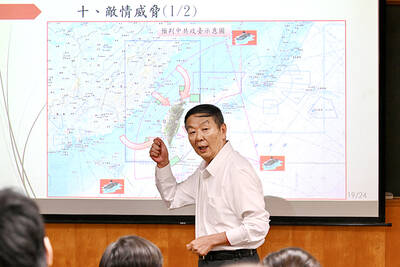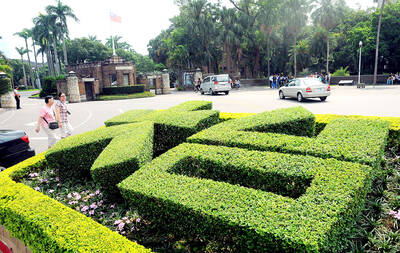Amendments to the Punishment Act of the Armed Forces (陸海空軍懲罰法) that were proposed after the death in 2013 of army corporal Hung Chung-chiu (洪仲丘), who is said to have died from abuse while serving in the military, yesterday cleared the legislature, including a stipulation to end the practice of confinement to “detention barracks.”
The punishment of confining soldiers to detention barracks has been changed to requiring them to “repent,” and the maximum period of penitence that a soldier could be subjected to has been revised from 30 days to 15 days.
The penitence would be conducted in a “penitence room,” the establishment of which has been stipulated to fall within the Ministry of National Defense’s remit. Other responsibilities to be taken over by the ministry include the definition of educational content to be delivered to repenting soldiers, and the qualifications and accountability of the personnel managing the penitence rooms.

Photo: Chien Jung-fong, Taipei Times
According to the newly amended act, those who are disciplined through measures involving restraints of their personal freedom can appeal to a court or the authority in charge of the punishment in a written document or oral statement. The court, upon receiving the protest, would immediately inform the disciplinary unit, which would then review the appeal within 24 hours and retract or annul the punishment if the protest is found to be justified or penitence is deemed unnecessary.
The categories of disciplinary measures have been broadened, with ranking officers now also subject to reductions in rank; non-commissioned officers to dismissal, reduction in rank and restrictions; and enlisted personnel to forfeiture of pay.
“Reforming training” as one of the possible punishments for non-commissioned officers and enlisted personnel has been scrapped.
Other changes include making sexual harassment, sexual assault and sexual bullying punishable offenses, as well as driving under the influence of alcohol or without a license.
Hung Tzu-yung (洪慈庸), Hung Chung-chiu’s older sister and one of the New Power Party’s legislative candidates, said on Facebook that, while she is glad to see the attempts of the ministry and the legislature to better the human rights situation in the military, she still holds misgivings about part of the revision.
“Changing ‘detention’ to ‘penitence’ will be putting old wine in new bottles if the environment of penitence as a kind of punishment does not improve. Soldiers who are disciplined could still be abused by the disciplinary environment or personnel during the penitence period,” Hung Tzu-yung said. “Hung Chung-chiu was put in a penitence room that was worse than detention barracks.”
She added that, although the right to appeal has been granted to officers and enlisted personnel by the amendments, “because of the military’s culture, those who have been punished would not dare lodge a claim, even if they felt the punishment was unreasonable.”
“It is not enough to simply have a legal framework established. The government also needs to make sure that individuals can protest without adverse consequences, otherwise the amendment is an empty promise,” Hung Tzu-yung said.
The military was stripped of its right to prosecute its personnel during peacetime by the legislature in August 2013, soon after Hung Chung-chiu’s death and a subsequent mass protest by tens of thousands of people.

RETHINK? The defense ministry and Navy Command Headquarters could take over the indigenous submarine project and change its production timeline, a source said Admiral Huang Shu-kuang’s (黃曙光) resignation as head of the Indigenous Submarine Program and as a member of the National Security Council could affect the production of submarines, a source said yesterday. Huang in a statement last night said he had decided to resign due to national security concerns while expressing the hope that it would put a stop to political wrangling that only undermines the advancement of the nation’s defense capabilities. Taiwan People’s Party Legislator Vivian Huang (黃珊珊) yesterday said that the admiral, her older brother, felt it was time for him to step down and that he had completed what he

Taiwan has experienced its most significant improvement in the QS World University Rankings by Subject, data provided on Sunday by international higher education analyst Quacquarelli Symonds (QS) showed. Compared with last year’s edition of the rankings, which measure academic excellence and influence, Taiwanese universities made great improvements in the H Index metric, which evaluates research productivity and its impact, with a notable 30 percent increase overall, QS said. Taiwanese universities also made notable progress in the Citations per Paper metric, which measures the impact of research, achieving a 13 percent increase. Taiwanese universities gained 10 percent in Academic Reputation, but declined 18 percent

UNDER DISCUSSION: The combatant command would integrate fast attack boat and anti-ship missile groups to defend waters closest to the coastline, a source said The military could establish a new combatant command as early as 2026, which would be tasked with defending Taiwan’s territorial waters 24 nautical miles (44.4km) from the nation’s coastline, a source familiar with the matter said yesterday. The new command, which would fall under the Naval Command Headquarters, would be led by a vice admiral and integrate existing fast attack boat and anti-ship missile groups, along with the Naval Maritime Surveillance and Reconnaissance Command, said the source, who asked to remain anonymous. It could be launched by 2026, but details are being discussed and no final timetable has been announced, the source

CHINA REACTS: The patrol and reconnaissance plane ‘transited the Taiwan Strait in international airspace,’ the 7th Fleet said, while Taipei said it saw nothing unusual The US 7th Fleet yesterday said that a US Navy P-8A Poseidon flew through the Taiwan Strait, a day after US and Chinese defense heads held their first talks since November 2022 in an effort to reduce regional tensions. The patrol and reconnaissance plane “transited the Taiwan Strait in international airspace,” the 7th Fleet said in a news release. “By operating within the Taiwan Strait in accordance with international law, the United States upholds the navigational rights and freedoms of all nations.” In a separate statement, the Ministry of National Defense said that it monitored nearby waters and airspace as the aircraft